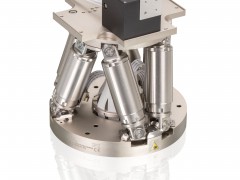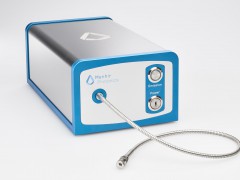
Natural Branding, Laser Marking for Organics
source:Photonics
release:Nick
keywords: lasers; laser marking; natural branding
Time:2017-10-27
The organic food business is experiencing a period of rapid economic growth as people around the globe seek natural food that’s better for them and for the environment. Eosta, an international distributor of fresh organic fruits and vegetables, is going a step further by getting rid of the packaging and stickers on their products.
Instead, the Dutch company is using CO2 lasers to naturally brand its fruits and veggies before shipping them out to stores. Natural branding is a contactless, eco-friendly manner of branding a piece of fruit or vegetable.

What makes it natural is that no additional substances are added — making it different from laser tattoos and fruit tattoos that use ink. The use of a laser does not create new chemical substances, nor does it increase decay or contamination. A low-energy CO2 laser merely etches an image on the outermost layer of the peel, removing the pigment only.
“The fruits and vegetables taste exactly the same; it’s completely safe and it’s completely organic,” said Michaël Wilde, Eosta’s communications and sustainability manager.
While natural branding via laser is still a fairly new concept, companies like Eosta are using it to differentiate organic products from conventional products, eliminating the use of stickers and distinctive packaging.
“Legislation requires us to differentiate the organic product from the nonorganic product, and that’s what we are doing here,” said Wilde. “This is the future, as far as we are concerned, when it comes to packing fruits and vegetables — no packing.”
The amount of CO2 emission for a laser mark is less than 0.2 percent of the amount for a sticker of similar size.
Wilde told Photonics Media that consumer response has been great, and they are already getting requests to laser brand other products.
“We are selling naturally branded products throughout Europe and are somewhat flabbergasted by the positive reaction from the market,” he said. “We have received inquiries from bakeries and oyster farmers, so I guess the applications are very broad. I can also see it being used … to mark products for Valentine’s Day, Christmas and Halloween.”
Wilde added that he sees more and more food goods being marked to avoid packaging as people look for more sustainable alternatives to plastic.
Eosta brands produce such as avocados, sweet potatoes, mangoes and apples. By naturally branding and eliminating plastic and other packing materials in their avocados alone, the company says it will save 750,000 plastic flow packs just this year.
Grocery retailer ICA Sweden has naturally branded organic avocados and sweet potatoes from Eosta in its produce section. Each is adorned with product name, country of origin and PLU code.
“This way, organic products do not need to be kept separate from others,” said Peter Hägg, head of the fruit and vegetables product range at ICA Sweden. “Since the marking is on each item, there is no need for stickers, trays or cellophane wrap around the product. The total effect is substantial.”
Natural branding has become the organic version of laser marking, and fittingly, it’s being applied to organic produce as an attractive, easy and sustainable alternative to plastic and stickers — leaving a mark on produce, and not the environment.
Instead, the Dutch company is using CO2 lasers to naturally brand its fruits and veggies before shipping them out to stores. Natural branding is a contactless, eco-friendly manner of branding a piece of fruit or vegetable.

What makes it natural is that no additional substances are added — making it different from laser tattoos and fruit tattoos that use ink. The use of a laser does not create new chemical substances, nor does it increase decay or contamination. A low-energy CO2 laser merely etches an image on the outermost layer of the peel, removing the pigment only.
“The fruits and vegetables taste exactly the same; it’s completely safe and it’s completely organic,” said Michaël Wilde, Eosta’s communications and sustainability manager.
While natural branding via laser is still a fairly new concept, companies like Eosta are using it to differentiate organic products from conventional products, eliminating the use of stickers and distinctive packaging.
“Legislation requires us to differentiate the organic product from the nonorganic product, and that’s what we are doing here,” said Wilde. “This is the future, as far as we are concerned, when it comes to packing fruits and vegetables — no packing.”
The amount of CO2 emission for a laser mark is less than 0.2 percent of the amount for a sticker of similar size.
Wilde told Photonics Media that consumer response has been great, and they are already getting requests to laser brand other products.
“We are selling naturally branded products throughout Europe and are somewhat flabbergasted by the positive reaction from the market,” he said. “We have received inquiries from bakeries and oyster farmers, so I guess the applications are very broad. I can also see it being used … to mark products for Valentine’s Day, Christmas and Halloween.”
Wilde added that he sees more and more food goods being marked to avoid packaging as people look for more sustainable alternatives to plastic.
Eosta brands produce such as avocados, sweet potatoes, mangoes and apples. By naturally branding and eliminating plastic and other packing materials in their avocados alone, the company says it will save 750,000 plastic flow packs just this year.
Grocery retailer ICA Sweden has naturally branded organic avocados and sweet potatoes from Eosta in its produce section. Each is adorned with product name, country of origin and PLU code.
“This way, organic products do not need to be kept separate from others,” said Peter Hägg, head of the fruit and vegetables product range at ICA Sweden. “Since the marking is on each item, there is no need for stickers, trays or cellophane wrap around the product. The total effect is substantial.”
Natural branding has become the organic version of laser marking, and fittingly, it’s being applied to organic produce as an attractive, easy and sustainable alternative to plastic and stickers — leaving a mark on produce, and not the environment.
MOST READ
- RoboSense is to Produce the First Chinese Multi-beam LiDAR
- China is to Accelerate the Development of Laser Hardening Application
- Han’s Laser Buys Canadian Fiber Specialist CorActive
- SPI Lasers continues it expansion in China, appointing a dedicated Sales Director
- Laser Coating Removal Robot for Aircraft
PRODUCTS
 FISBA exhibits Customized Solutions for Minimally Invasive Medical Endoscopic Devices at COMPAMED in
FISBA exhibits Customized Solutions for Minimally Invasive Medical Endoscopic Devices at COMPAMED in New Active Alignment System for the Coupling of Photonic Structures to Fiber Arrays
New Active Alignment System for the Coupling of Photonic Structures to Fiber Arrays A new industrial compression module by Amplitude
A new industrial compression module by Amplitude Menhir Photonics Introduces the MENHIR-1550 The Industry's First Turnkey Femtosecond Laser of
Menhir Photonics Introduces the MENHIR-1550 The Industry's First Turnkey Femtosecond Laser of Shenzhen DNE Laser introduced new generation D-FAST cutting machine (12000 W)
more>>
Shenzhen DNE Laser introduced new generation D-FAST cutting machine (12000 W)
more>>
